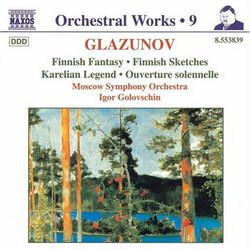| All Artists: Alexander Glazunov, Igor Golovschin, Moscow State Symphony Orchestra Title: Glazunov: Finnish Fantasy; Finnish Sketches; Karelian Legend; Ouverture solennelle Members Wishing: 0 Total Copies: 0 Label: Naxos Release Date: 5/11/1999 Genres: Special Interest, Classical Styles: Marches, Forms & Genres, Fantasies, Symphonies, Symphonies Number of Discs: 1 SwapaCD Credits: 1 UPC: 730099483926 |
Search - Alexander Glazunov, Igor Golovschin, Moscow State Symphony Orchestra :: Glazunov: Finnish Fantasy; Finnish Sketches; Karelian Legend; Ouverture solennelle
CD DetailsSimilarly Requested CDs
|
CD ReviewsAn Unorthodox "Take" on Finnish Music Thomas F. Bertonneau | Oswego, NY United States | 10/27/2000 (4 out of 5 stars) "The compositions on this disc represent a stab at "multiculturalism" (always an issue in imperial politics) a century or so before the term came into use. Russia owned Finland, having acquired it from Sweden in the eighteenth century under Peter the Great, and did not relinquish dominion until until the abdication of the last Romanov in 1917. Even then Lenin and the Bolsheviks tried to keep Finland in Mother Russia's fold, fomenting an attempt in Helsinki to stage a repetition of the St. Petersburg coup-d'etat and otherwise trying to export their revolution. The Finns rallied against their internal communist insurgency and gained independence after a bitter civil war. Ten years earlier, Alexander Glazunov (1865-1936) had written the first of a number of orchestral works celebrating the (then) Grand Duchy of Finland, one of which, the "Finnish Fantasy" (1909), extends the hand of friendship to His Majesty's imperial subjects as far as quoting Luther's hymn "Ein Feste Burg." (The Finns were predominantly Lutheran, having formerly been subjects of the Swedish crown, their land in those days bearing the name of "Finnmark.") It is an effective work, full of Karelian melodies not unlike those in Sibelius or Madetoja (both technically Russian crown-subjects until 1917). The two "Finnish Sketches" mine the same Karelian vein and so does the extensive "Karelian Fantasy," written in the very year when Finland at last became Finland. Despite the Suomian material, it sounds (of course) like Glazunov: Brilliantly orchestrated, competently joined, reasonably exciting. I have been fond of the "Finnish Fantasy" since it appeared thirty years ago on an Angel-Melodiya LP conducted, I think, by Svetlanov. Here Igor Golovschin leads the Moscow Symphony Orchestra, closing the program with the suitably pompous "Overture Solennelle" and the delightful "Wedding March," both from around the turn of the century. Ultimately, the Finns wanted Finns to celebrate them musically ("Give us Finlandia!"), but we are far enough removed from that rancorous debate to take the music on its own lovely terms."
|


 Track Listings (6) - Disc #1
Track Listings (6) - Disc #1








